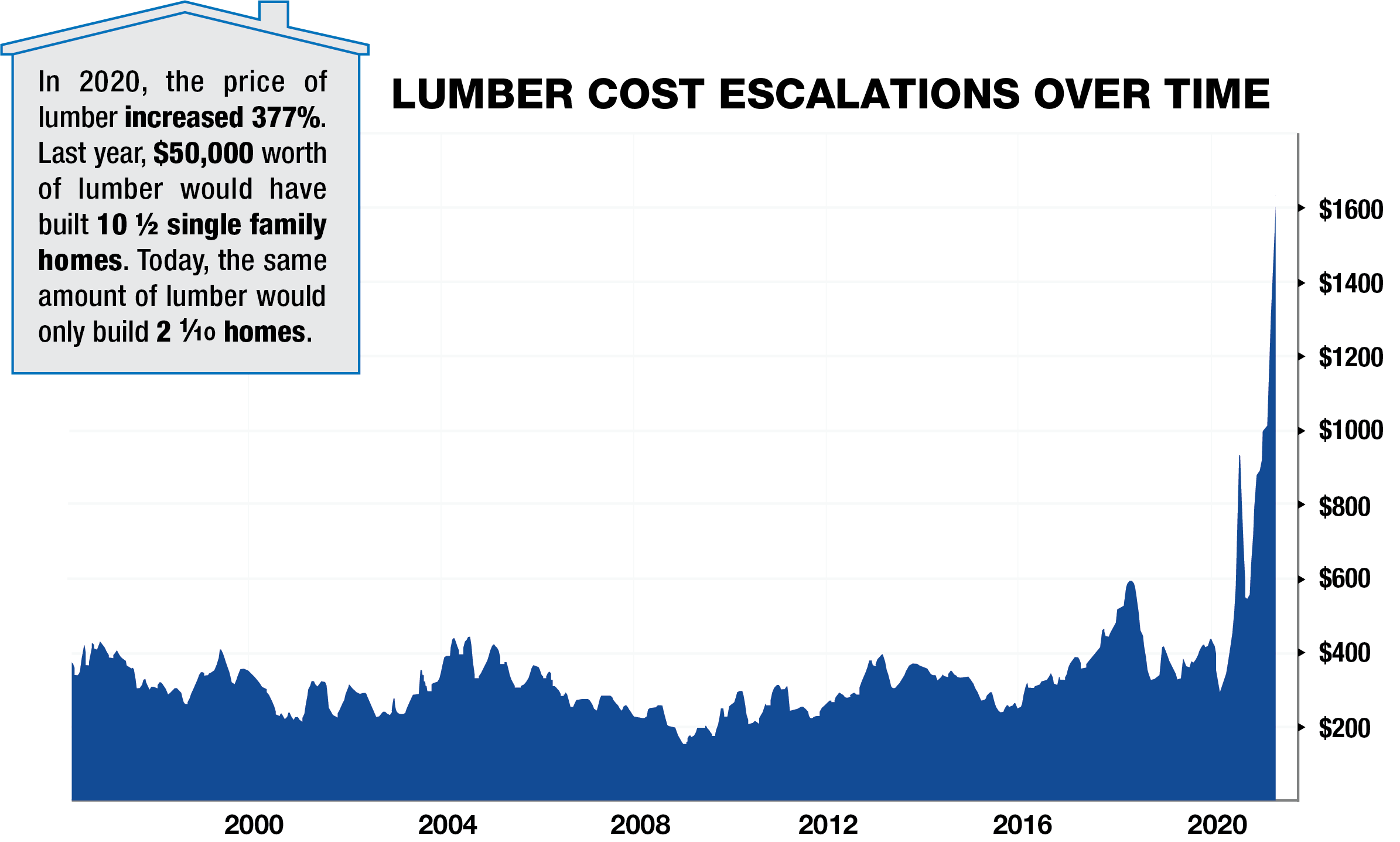Escalation Clause: An escape from the price-spike trap
Anyone in real estate development would have to be living under a rock not to know about skyrocketing lumber and material prices in the “post”-pandemic world. Pre-pandemic, the average cost for 1,000 board feet of was $200-$400 per 1,000 bd ft. As of this past May, that price jumped to $1,600 per 1,000 bd ft.
For context, the same 50,000 bd ft delivery that would have built just over 10 average single homes in May 2020 (or nearly 15 homes in 2015), will only build just over 2 of the same homes as of May 2021.1
It’s great for lumber yards (and traders in the lumber futures market), but a potential death blow for anyone owners and builders alike operating nearly any form of contract.
Builders themselves can’t get lumber, or if they can, they are lucky not to take a loss on the contract. Owners and/or General Contractors find themselves with builders either unable, or unwilling, to perform – and in many cases, demanding change-orders, contract modifications, or in some cases, outright litigation.
Prices have eased in the past few months, but are still well above pre-pandemic (or even early-pandemic) levels.
So what is the answer? One solution is to dust off that oft-neglected price escalation clause. Owners often reject the clause outright (otherwise, why enter into a GMP or fixed-price contract), but a carefully negotiated price escalation clause can help spread the pain without crushing any one party to the agreement.2
Rather than look at “cost plus,” or “lump sum” contracts (which lie at the ends of the spectrum), we are going to look at the currently popular “Guaranteed Maximum Price” agreement – which should in theory land somewhere in between.
In many GMP contracts, owners are generally protected from material price increases due to the cap on total construction costs, while builders often build allowances or contingencies into their pricing structures to protect against, among other things, unexpected material cost escalations. In both cases, however, the key question is whether the contract specifically addresses the risk of material price escalations via the “escalation clause.” These escalation clauses usually fall into two common categories.
First up is the “event” or “delay” form of escalation clause, which allows the contractor to seek additional funds when delays in material procurement extend past a pre-determined period of days. Once the clock runs, a contractor can seek additional compensation for increased material costs, or is permitted to cease performance. This gives the owner a chance to make the call on paying more to finish on time, or potentially delaying completion. In essence, a contractor is agreeing to stand by its material prices for a certain period of time, but after that time, the contractor will look to the owner to pick a path forward – faster but more expensive, or slower and potentially less so.
Second up – and probably the most useful in today’s – is often referred to a “percentage-based” or “threshold” escalation clause. Such clauses provide that once material prices on the open market have increased by a certain percentage beyond what the contractor estimated at the time that the contract was signed, the owner and contractor will adjust the contract sum to account for the excess, in the form of either full or partial additional compensation to the contractor for the cost increases. This can mean the owner absorbing the cost, or the builder absorbing the cost up to the % threshold, after which, the owner bears the cost, or the owner and builder have a pre-determined split once the triggering price threshold is crossed.
As with any contract clause, both the “delay” based and “percentage” based escalation clauses require a nuanced review of the construction agreement at the outset. Owners, GCs, and subs should all be reviewing their contracts for – and negotiating in – clauses which spell out how sudden or unexpected pricing or supply changes will be handled. It is also worth recalling that both of these price escalation clauses presume delays or increased costs are not related to the contractor’s or owners (or sub’s) failure to perform, or other material breach, under the agreement.
Crafted correctly, these escalation clauses can provide predictable cost sharing (or as I call it these days, pain sharing), which in turn allows the parties to overcome supply price spikes without resorting to a sternly worded notice of breach, or worse, a visit from the sheriff’s process servers.

1 Data pulled from Census Bureau Home Preservation Manual Insider, referring to a “Single Family Unit as being 2,301 square feet, and requiring on average 14,496 board feet (or ~6.3 bd ft per sq ft).
2 Note that this doesn’t really apply to “cost-plus” or “time and materials” contracts, which already build in flexibility and simply pass the price of materials back to the owner, plus the built-in margin … although owners and builders alike should be aware of setting caps on the margin in regards to supply, or in some cases, phasing out the margin if supply costs increase beyond some pre-determined percentage.
